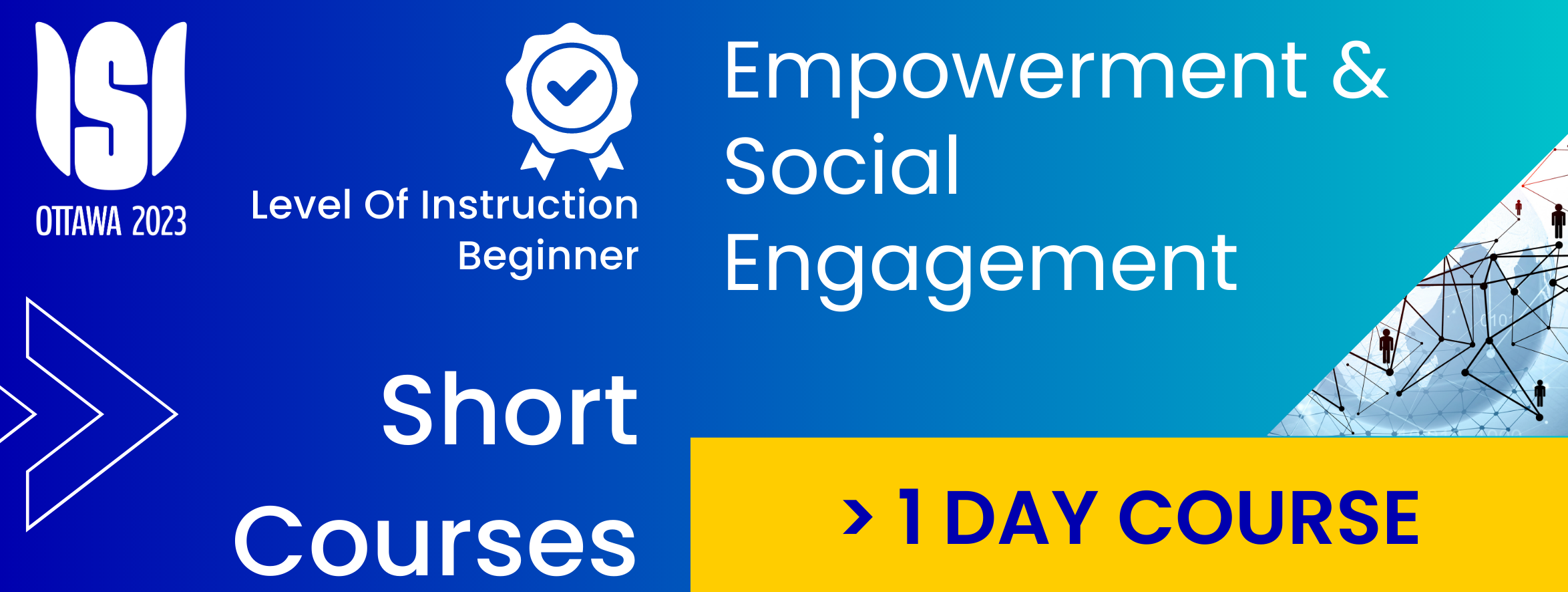Statistics for Empowerment and Social Engagement
Instructors: Pedro Campo, Joachim Engel, Peter Kovacs
July 15, 2023
This conference is currently not open for registrations or submissions.
About the Short Course: 1 Day Course
Effective citizen engagement with social issues requires active participation and a broad understanding of data and statistics about societal issues. However, many statistics curricula are not designed to teach relevant skills nor to improve learners' statistical literacy. This course offers practical approaches to working in a new field of knowledge - Civic Statistics - which sets out to engage with, and overcome well documented and long-standing problems in teaching quantitative skills. It is designed to promote and improve the critical understanding of quantitative evidence relevant to burning social issues - such as epidemics, climate change, poverty, migration, natural disasters, inequality, employment, and racism.
Evidence about social issues is provided to the public via print and digital media, official statistics offices, and other information channels, and a great deal of data is accessible both as aggregated summaries and as individual records. Our course illustrates the approaches needed to teach and promote the knowledge, skills, dispositions, and enabling processes associated with critical understanding of Civic Statistics presented in many forms. These include statistical analysis of authentic multivariate data, use of dynamic data visualizations, and deconstructing texts about the social and economic wellbeing of societies and communities.
In-Person Event. Location Of Short Courses: University of Ottawa
Who is this course for?
Learning Outcomes
- A conceptual Framework for Teaching Statistics about Society and its Educational Implication
- Tools, data sets and design principles for teaching civic statistics (including technology for visualizing and exploring multivariate data)
- Preparing for a data rich classroom: teaching civic statistics across the curriculum
- Implementing civic statistics in the class room: how to develop your own Material
Course Materials
A comprehensive booklet, specifically designed for this course.
A conceptual framework (an extraction of Chapter 4 of the Springer book, see below) Lesson plans available through Civic Stat Map (see freely available material), adapted for the course;
Delivery Structure
Time plan: short course runs 9:00 to 16:00, i.e. 7 hrs. of which 5.5 hrs. will be net time,
the rest for breaks, lunch, technical issues etc. Saturday, July 15, 9:00 – 16:00
- Opening (20’)
- Experience 1: Text-based tasks; Q&A (60’)
--- Coffee Break --- (20’) - Experience 2: data-visualization tasks: Q&A (50’)
--- Lunch break -- - Conceptual framework; (30’)
- Group discussion (20’)
- Experience 3: analysis of a dataset 1 (50’)
--- Coffee break --- (20’) - Experience 3: analysis of a dataset 2 (40’)
- Reflection & Discussion (20')
--- break for refreshments (10') - Intro to accessible materials: CivicStatMap (30’)
- Discussion: Challenges of implementing civic statistics: (30’)
Knowledge Assumed
Basic Statististical knowledge
Role of statistics in society
Basic ICT knowledge
Preparatory Material
Background for the course is Pro CivicStat material freely available here, and comprehensive book: Jim Ridgway (Editor), Statistics for Empowerment and Social Engagement. Teaching Statistics to develop informed Citizen. Springer, to be available by March 2023, ISBN 978-3-031-20747-Brief excerpts will be disseminated to the participants
About the instructor: Pedro Campos
Pedro Campos is an Assistant professor at the Faculty of Economics of the University of Porto (UP), with a PhD in Management Sciences from U. Porto, B.Sc. in Applied Mathematics (U. Portucalense). Since 2007, he became a methodologist at INE (Statistics Portugal). Previously in Statistics Portugal he was the head of the Dissemination Unit at the Northern Regional Directorate (2001-2003) and coordinated the Centre for Electronic Dissemination of Information (1997-2001), where he launched the first Statistics Web Portal (INFOLINE) and an electronic framework for disseminating resources for learning and teaching statistics (ALEA). He is also a researcher of LIAAD (Laboratory of Artificial Intelligence and Decision Support), which is a research group belonging to INESC Porto, LA. He coordinates the Post-Graduate Programme in in Business Intelligence and Analytics at PBS - Porto Business School. Pedro is actually Deputy Director of the international Statistical Literacy Project (ISLP) of IASE. He is an elected member of ISI and also member of the following associations: International Association for Statistical Education, (IASE), Portuguese Artificial Intelligence Association (APPIA), Portuguese Statistical Society (SPE), and Portuguese Association for Classification and Data Analysis (CLAD).
Affiliations: Pedro Campos, University of Porto, Portugal
About the instructor: Joachim Engel
Joachim Engel received a Diploma in Mathematics from the University of Bonn and a PhD in Applied Mathematics from the University of Southern California. He also was trained as a high school teacher. Since 2004 he is professor for mathematics and mathematics education, first at the University of Hannover, then at Ludwigsburg University of Education. He is author of two popular text books on applied mathematics. His research interests are in the area of statistical literacy, mathematical modeling, nonparametric statistics, statistics and society and data science education. He is elected as President of the International Association for Statistical Education (2019-2021); from 2015-2018 he was coordinator of the strategic partnership Pro CivicStat, funded by the Erasmus+ program of the EU.
Affiliations : Joachim Engel, Ludwigsburg University of Education, Germany
About the instructor: Peter Kovacs
Peter Kovacs is an Associate professor at the University of Szeged, Hungary, and chair of the Department of Statistics and Demography. Between 2014 to 2017 he was vice dean of the Faculty, and since 2017 Dean of the Faculty of economics. In addition, he is the chair of the Statistics Scientific Subcommittee of the Hungarian Academy of Science. His main research interests are statistical and financial literacy, statistics education development and multivariate statistical models. He leads a research group on financial literacy
Affiliations: Peter Kovacs, University of Szeged, Hungary
This conference is currently not open for registrations or submissions.
